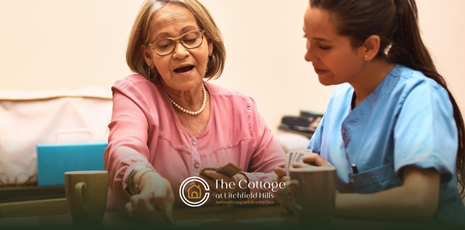Why Is Hydration Important for Seniors?

Proper hydration is crucial for seniors to maintain overall health and prevent complications. As we age, the body’s sense of thirst may decrease, making seniors more prone to dehydration. Staying hydrated supports digestion, regulates body temperature, maintains healthy skin, and aids kidney function.
Hydration also helps prevent common health issues in older adults, such as urinary tract infections, constipation, dizziness, and fatigue. Even mild dehydration can affect cognitive function, mood, and energy levels, making daily activities more challenging.
Encouraging regular fluid intake—through water, soups, and hydrating foods—can help seniors stay healthy and active. Monitoring fluid consumption and looking for signs of dehydration are essential steps for caregivers and family members.
At The Cottage at Litchfield Hills, staff prioritize hydration as part of a comprehensive care plan, ensuring residents receive the fluids they need to stay healthy, comfortable, and energized.
Frequently Asked Questions
How much water should seniors drink daily?
Generally, 6–8 cups, but individual needs may vary based on health and activity level.
Can seniors get hydration from foods?
Yes, fruits, vegetables, and soups contribute to daily fluid intake.
What are signs of dehydration in seniors?
Dry mouth, dizziness, fatigue, confusion, and decreased urine output.
Sources:
- https://www.uclahealth.org/news/article/hydration-and-older-adults-why-water-matters-more-you-age
- https://www.ncoa.org/article/how-to-stay-hydrated-for-better-health/






